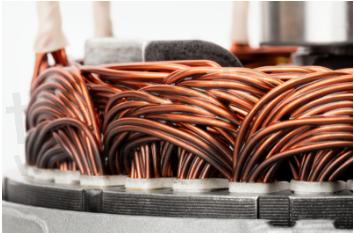WACKER Presents Silicone Resins SILRES® H60 A/B and SILRES® H62 C for the Impregnation of Electric Motors

At CWIEME, the international trade fair for coil winding, insulation and electrical manufacturing, WACKER is presenting silicone-based specialty resins for impregnating electric motors. The focus is on products for trickle impregnation, but also for dipping and vacuum processes. Highlights at CWIEME also include the room-temperaturecuring silicone rubber ELASTOSIL® N 2076. It allows electrical coil windings to be permanently protected against moisture and environmental influences.

WACKER’s SILRES® H60 silicone resin was specifically developed for the trickle impregnation of electric motors. The highly heat-resistant product will be presented at this year's CWIEME trade fair.
Two silicone resins was spotlighted at this year’s WACKER booth: SILRES® H60 A/B and SILRES® H62 C. Both products were developed for the impregnation of electric motors. SILRES® H60 A/B is a fast-curing two-component phenyl silicone resin formulated without inhibitor. Rapid gel formation already occurs in the initial phase of thermal curing. The resin then crosslinks rapidly to form a thermoset with a hardness of 65 Shore D. The product is intended for direct use and is free from solvents and reactive crosslinking agents.
The high curing speed of the silicone resin is comparable to that of organic impregnating resins. The gel time is about 13 minutes at 150℃. At this temperature, the material is fully cured after six hours. At 180℃, the gel time drops to five minutes and curing takes just two and a half hours.
The cured resin is transparent and has a non-tacky hydrophobic surface. With a dielectric strength of 27 kV/mm, measured as per IEC 60243-1, the product is a very good electrical insulator. It is largely chemically inert and resistant to aging and heat. Operating temperatures of up to 200℃ do not cause any problems. Winding impregnation with SILRES® H60 therefore corresponds to at least thermal insulation class H in accordance with EN 60085, if not higher. The silicone resin can withstand short-term temperature peaks even beyond the continuous operating temperature.
SILRES® H62 C: Proven for Decades
The phenyl silicone resin SILRES® H62 C has proven itself for decades as an impregnating agent in traction motors. Electric rail vehicles and drive motors for hybrid and electric cars are among the preferred areas of application. Unlike many organic impregnating resins, the ready-to-use product contains neither solvents nor reactive diluents. The liquid formulation is usually applied at temperatures between 60 and 80℃ and cured at temperatures between 170 and 200℃.
SILRES® H 62 C contains an inhibitor to delay the curing reaction. This is particularly advantageous if the resin is used in the classic dipping or vacuum pressure impregnation (VPI) process. In such cases, the resin must remain liquid until the motor winding is com-pletely saturated. These processes are mainly used for large machines, for example for impregnating traction motors for rail vehicles or diesel-electric haul trucks for open-cast mining.
Room-Temperature Curing Silicone
At this year’s CWIEME trade show, WACKER also was presenting a silicone-based protective coating, which meets the current standard for fire protection in rail vehicles. This was the room-temperature-curing silicone ELASTOSIL® N 2076.
The product is single-component and, with sufficient humidity, cures to form a flexible, medium-hardness elastomer, which permanently protects the electrical windings of transformers or choke coils against moisture, dirt and deposits. ELASTOSIL® N 2076 is weather and UV resistant, electrically insulating, and heat resistant. The product is even suitable as a protective coating for the winding head of traction motors. Such components can reach temperatures of up to 200℃ in continuous operation.
ELASTOSIL® N 2076 is flame retardant and meets the corresponding requirements of the European standard EN 45545-2 for fire protection in rail vehicles. Consequently, the product is approved for internal components that fall under requirement set R22 and have been classified for hazard levels HL1 and HL 2. For external components, ELASTOSIL® N 2076 is also suitable for the highest hazard level HL 3 in accordance with the requirement sets R 23 and R 24.
- +1 Like
- Add to Favorites
Recommend
This document is provided by Sekorm Platform for VIP exclusive service. The copyright is owned by Sekorm. Without authorization, any medias, websites or individual are not allowed to reprint. When authorizing the reprint, the link of www.sekorm.com must be indicated.


























































































































































































































































































































































































































































































































































































































































































































































































































































































































